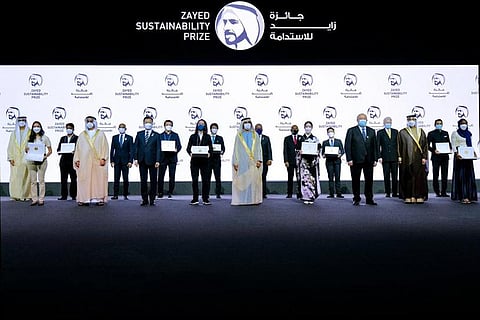Zayed Sustainability Prize Demonstrates Global Reach with High Entries
The Zayed Sustainability Prize, the UAE's pioneering global award for recognising excellence in sustainability, has officially closed entries for its 2023 awards cycle.
Over 4,500 applications were received across the five Prize categories of Health, Food, Energy, Water and Global High Schools, from a record 152 countries, demonstrating the Prize’s growing global reach and impact.
The Zayed Sustainability Prize winners will be announced at the 2023 Zayed Sustainability Prize Awards Ceremony that will be held on January 16, 2023 as part of Abu Dhabi Sustainability Week.
The Prize witnessed a 13% increase in submissions compared to last year from small and medium-sized enterprises (SMEs), nonprofit organisations and high schools.
Hamdan bin Zayed Reviews Efforts to Rehabilitate Marine Life
Total submissions from SMEs increased across all categories, underscoring a rising trend that SMEs are putting sustainability at the top of their agenda.
H.E. Dr. Sultan Ahmed Al Jaber, UAE Minister of Industry and Advanced Technology said: “For the last 14 years the Zayed Sustainability Prize has incentivised practical solutions to global challenges that deliver tangible impact at a community level.
"Inspired by the commitment to sustainable development and humanitarian legacy of Sheikh Zayed bin Sultan Al Nahyan, the Prize has improved the lives of 370 million people in 151 countries to date.
"This year, we have seen applications from a record number of countries across every category from health, food, energy, water and global high schools.
"I'm excited to see what creative solutions this year’s applicants will bring to the table, particularly as the UAE prepares to host COP 28 next year."
This year’s submissions were more diverse than ever before, revealing climate change’s impact on every country across every continent, and reflecting a growing awareness that urgent climate action is critical to meet global net zero carbon goals by mid-century.
More submissions received this year came from developing nations in Sub-Saharan Africa, South Asia, East Asia, Latin America, the Middle East, and North Africa, which is an important indication of the growing participation of developing countries in the fight against climate change.
The Food (1,426) and Health (946) categories attracted the greatest number of submissions, followed by Energy (736) and Water (601), while the Global High Schools category received 829 submissions.
In the Food category, which received nearly 20% increase in submissions compared to last year, many entries presented solutions aimed at achieving sustainable food production to address rising food insecurity and malnutrition in a world threatened by climate change.
In the Health category, several entries address the weaknesses of the healthcare systems exposed by the Covid-19 pandemic, and offer solutions that provide more resilient, inclusive, accessible, and sustainable healthcare services to people most in need.
In the Energy category, the Prize received numerous entries focused on improving sustainable energy access in vulnerable communities, supporting United Nations Sustainable Development Goal 7, affordable and clean energy for all, and driving the low-carbon energy transition.
Finally, in the Water category, a number of entries offered solutions aimed at addressing the clean water production, climate change, and water resource management challenges faced around the world, and particularly in developing nations.
Following the close of submissions, the Prize now enters the evaluation stage. All entries will now be shortlisted by an independent research and analysis consultancy.
A Selection Committee comprised of globally renowned industry experts will then assess the qualified entries and shortlist the candidates. The third and final tier of the evaluation process is the Jury, which will convene in October, to unanimously elect the winners in each category.
Since its launch in 2008, the $3 million Prize has, directly and indirectly, transformed the lives of over 370 million people around the world.
Its global impact continues to grow, as it further catalyses humanitarian outreach and sustainable development.
Each winner in the Health, Food, Energy, and Water categories receive US$600,000 to expand the scope and scale of their sustainability solution(s), while the Global High Schools category has six winners, representing six world regions.
Read More: UAE and France Sign MoU to Advance Climate Action


